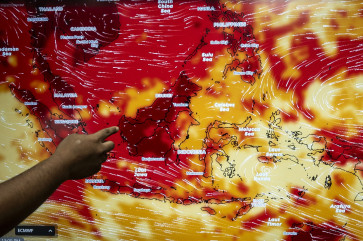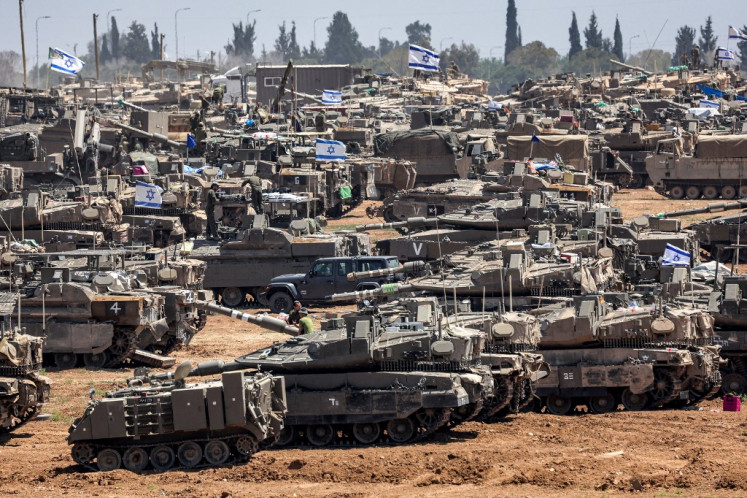Paid donors burgeon as supplies run low
Rising demand:: A man has his blood taken during a blood donation event in Gorontalo, northern Sulawesi
Change Size
 Rising demand:: A man has his blood taken during a blood donation event in Gorontalo, northern Sulawesi. Illegal trading in blood is on the rise in the province as the local chapter of the Indonesian Red Cross (PMI) is able to provide only half of the 1,200 bags of blood that local hospitals need each month. (JP/Syamsul Huda M. Suhari) (PMI) is able to provide only half of the 1,200 bags of blood that local hospitals need each month. (JP/Syamsul Huda M. Suhari)
Rising demand:: A man has his blood taken during a blood donation event in Gorontalo, northern Sulawesi. Illegal trading in blood is on the rise in the province as the local chapter of the Indonesian Red Cross (PMI) is able to provide only half of the 1,200 bags of blood that local hospitals need each month. (JP/Syamsul Huda M. Suhari) (PMI) is able to provide only half of the 1,200 bags of blood that local hospitals need each month. (JP/Syamsul Huda M. Suhari)
Rising demand:: A man has his blood taken during a blood donation event in Gorontalo, northern Sulawesi. Illegal trading in blood is on the rise in the province as the local chapter of the Indonesian Red Cross (PMI) is able to provide only half of the 1,200 bags of blood that local hospitals need each month. (JP/Syamsul Huda M. Suhari)
'What blood type do you need? Many here offer blood type A, B or O, and the price is Rp 200,000 [US$17.50] per bag,' a middle-aged man wearing dark glasses said with rapid-fire delivery.
'However, for rare blood types, such as AB, the price is higher. It can reach over Rp 300,000. Only two people here have type AB blood,' added the man, a pedicab driver, while nearby drivers gave their
affirmations.
Although blood donation is a voluntary activity, the limited blood stocks at the Blood Transfusion Unit (UTD) of the Indonesian Red Cross' (PMI) Gorontalo chapter has led to a presence of commercial
blood donors.
Pretending to look for a donor, The Jakarta Post discovered several pedicab drivers napping in their vehicles in front of a shopping center located near the UTD. They woke up immediately to greet their potential 'clients'.
One driver, who requested anonymity, said that many people use his and his fellow drivers' services when the UTD runs out of required blood stocks.
He said that some of the drivers had become commercial blood donors to earn additional income. Armed with formal donor cards issued by the PMI, they convince prospective clients to use their blood.
Most of the drivers who acted as paid blood donors, he said, were aware of the eligibility requirements surrounding the health of donors, so they maintained their health, took adequate rest and refrained from drinking alcohol before donating blood.
However, some paid donors often put their own health in danger.
Gorontalo resident Deby Hariyanti, 31, said she was once approached by a commercial donor as she was looking for information on the blood stocks at the UTD. At the time, one of her relatives was ill and needed two bags of type B blood.
'The person approached me to offer his blood at a low price of Rp 150,000 per bag, but I refused because he looked very pale, probably due to donating too much blood,' Deby said.
Gorontalo City PMI UTD director Dr. Yana Suleman claimed the mushrooming number of paid blood donors was the result of a lack of public awareness about donating blood.
Another factor, she added, was the dependence of many hospitals in the city and in five other regencies on blood stocks from the Gorontalo City UTD.
Each month, she said type B blood the unit received an average of 1,200 requests for blood, but could only meet half of the demand. Consequently, the families of patients who need blood must look for donors.
Yana said that her unit had initiated blood-donation communities in three districts in the province and hoped that the remaining six districts would follow suit this year.
Gorontalo Governor Rusli Habibie also plans to issue a policy that would require prospective brides and grooms and government-aid beneficiaries to donate blood.
Yana said Gorontalo province could overcome shortages if at least 2 percent of its 1 million residents became regular donors.
Separately, Neilan Poneta, 28, an activist from the blood donation community, DOSIS, said her group encouraged youth to become active donors.
Since its inception at the end of 2012, DOSIS has attracted 50 active donors, according to Neilan. 'We wish to make blood donation a part of Gorontalo's younger generation's lifestyle,' she said.
Neilan added that many students are in fact enthusiastic about blood-donation events, but said her group often faced obstacles in securing permits from campus management. She said some people were reluctant to donate blood because they are afraid of needles and blood.
Donor Mentari Ariesta, 22, said it was common for novice donors to be nervous, so it is preferable if they were accompanied by regular donors who could show that they did not need to fear blood and needles.









